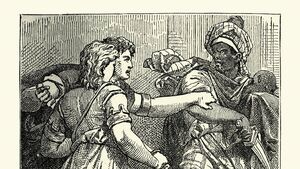Living Greener: We are losing our ideals while belittling the past

Vintage engraving of a scene from Titus Andronicus by William Shakespeare
WHEN I write about learning from the wisdom of our ancestors, people often respond with surprising hostility, saying that back then everyone was miserable, and lived in ignorance and superstition.
It’s a surprising response, since most people today seem pretty miserable, ignorant and superstitious, and few people I know read books anymore.
They are incredulous when I inform them that most of their ancestors, in Ireland and across Europe, were far more literate and educated than most people today.
Even in the much-maligned Middle Ages, about half of peasants could read and write, according to author Seb Falk in The Light Ages. The only reason reading wasn’t universal was that books were rare and precious, but when printing changed that, schools multiplied across countries like England, teaching girls as well as boys, usually teaching the great history and philosophy books of Greece and Rome.
In Ireland, teaching was banned altogether for Catholics, but they set up their own network of secret “hedge schools” to teach young people Greek and Latin. Irish farmers from a century ago, like Stephen Rynne in his memoir Green Fields, describe their farmhands reading St Augustine’s Confessions, despite their poverty.
By 1600, Shakespeare could write plays about Coriolanus or Titus Andronicus, confident that everyone in the audience would understand who these people were. The most famous writers of the age translated Ancient Greek and Latin texts into English, as Alexander Pope did with the Iliad or John Dryden did with the Aeneid; we remember these writers for their original works, but much of their time and energy went into translations of the classics.
To get an idea of how widespread this was, read the introduction to Lorna Doone, one of the most beloved of English novels.
The narrator describes himself as “nothing but a plain, unlettered man” and an “ignoramus”.
Yet two paragraphs later he describes what an unlettered ignoramus meant in the 1600s – “…by the time I was twelve years old … I could make bold with Eutropius and with Caesar -- by aid of an English version – and as much as six lines of Ovid,” meaning reading it in Latin.
Lorna Doone was a fictional work written after the time period it describes, but its depiction of a yeoman of the time is not unrealistic.
In Homerides (1715) Thomas Burnet and George Duckett said that thanks to Pope, “every country milkmaid may understand the Iliad as well as you or I”.
Nor was it unusual for someone to learn such texts as a child; in 1788 future novelist William Hazlitt wrote to his brother, “Next Monday I shall begin to read Ovid's Metamorphoses and Eutropius."
He was ten. Poet Robert Burns described visiting a gardener’s wife in 1787, and wrote that “she can repeat by heart almost everything she has ever read, particularly Pope’s ‘Homer’ from end to end”. These were probably unusual individuals, but even a populace with a tenth of their knowledge would be far beyond many professors now.
Having cultural references rooted in Greek and Roman classics wasn’t limited to England either; when a group of Italian scholars created the first operas around 1600, they were consciously trying to emulate the sung verses of Greek plays, and they chose to write operas about Greek and Roman classics.
We also know that the basic myths must have been already familiar to the audiences, who could read between the lines in a way that we often don’t.
Claudio Monteverdi’s last opera, for example —The Coronation of Poppea — ended with a love scene between the Roman emperor Nero and his mistress. On the surface it appears a happy ending for them, but Venetian audiences of the time would have understood the meta-level of irony, for they – unlike most of us – knew their Tacitus and Suetonius, and how tragically Nero and Poppea’s story would end.
Teaching the Greek and Roman classics continued for centuries until just recently, when it was abandoned – which is a shame, for it is from them that European Western culture, uniquely in world history, developed concepts like democracy, science, schools, elections, theatre, public speakers, newspapers, protests, libraries, voting, juries, and even concepts like “citizen” or “free”.
Now that we are losing these cultural reference points, we are losing these ideals as well, as even Western countries are passing laws restricting freedom of speech or religion. If we lose our history and the roots of our culture, we lose any values that make our world worth keeping.





